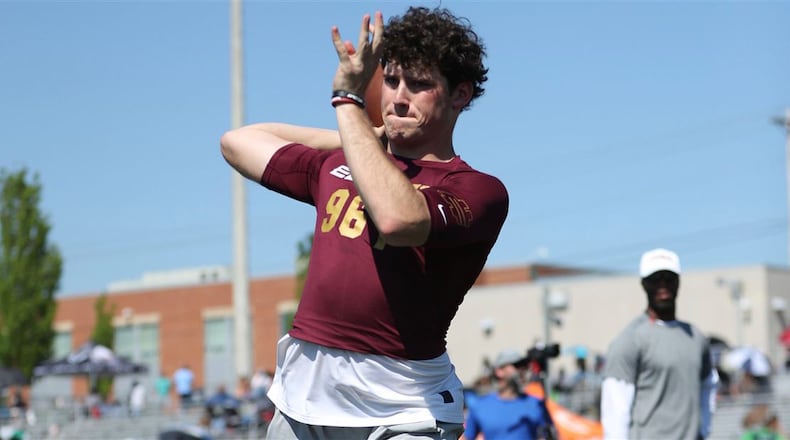Mikele Colasurdo learned a lesson — the hard way.
The Georgia State quarterback won’t be able to play this season because of a heart condition related to COVID-19. The 19-year-old freshman admits he is in part responsible for having a season of football ripped away from him.
He stepped outside the safety of the football-program bubble.
“The reason I got COVID in the first place was me being selfish and seeing people outside the football facility without a mask,” Colasurdo said Tuesday in a video conference. “I wasn’t doing my part. I learned a lesson the hard way. I don’t want anyone else to go through this.”
Colasurdo had been on Georgia State campus for workouts since the middle of June. The next month, he visited some friends. After noticing a tickle in his throat, he contacted trainer Bob Murphy and was tested for the coronavirus July 28.
The thought was that he would test negative and return to practice. That was not the case.
Colasurdo tested positive and returned home to South Carolina. He attended meetings by video conference and stayed for nearly three weeks. He experienced some chest tightness (he does have some asthma issues), a headache and some congestion, common cold-like symptoms. He returned to school in the middle of August and twice tested negative.
The thought was that he would return to practices. That was not the case.
Colasurdo received a text from Murphy because of concerns about heart issues that could arise in people who had COVID-19. He underwent an EKG, an echocardiogram and some blood work. That same day, he received the troubling news. Tests showed some inflammation in his heart. On Friday, Colasurdo announced on social media that the condition would cost him the season.
“A lot of people have heard this can happen, this is a possibility, but to put a face with a story, it makes it more real, especially, me being a 19-year-old athlete, a healthier person,” Colasurdo said. “I’m not someone who has a pre-existing condition. Just so everyone realizes, you are not immune from this. This could happen to you, too.
“I was one of those people who thought I might get COVID, but the long-term stuff isn’t going to happen to me. I was a little bit stunned. When it hit me with sadness was today I watched our team practice. That’s when it really hit me. Man, I’m going to miss this when games start coming around.”
Colasurdo said he is experiencing some chest tightness and has begun some light medication. He will visit a cardiologist again to determine whether he has myocarditis or pericarditis to determine the location of the heart inflammation. He said doctors do not believe there will be long-term heart issues and that his recovery could be between 3-6 months. Colasurdo said it was explained to him that his heart was strained in fighting the virus.
Colasurdo, a prize signee who was Mr. Football in South Carolina last season, was to compete for the starting position to replace Dan Ellington. He was competing with holdovers Cornelious Brown and Kierston Harvey and Jamil Muhammad, a transfer from Vanderbilt.
Colasurdo is thankful he was in the bubble of the Georgia State football program. It’s how his condition was detected.
“Where I’m at, I’m safer than if I was at home,” he said. “All of these athletes, they are not going to quit training when they go home (if sports are canceled). When you send all of these athletes home, they are going to continue to work out, they are going to continue to throw and do hard workouts. The fact that I could do that here and get my tests here. That’s the main reason they caught this. If I were to be at home, I would have never known.”
About the Author



